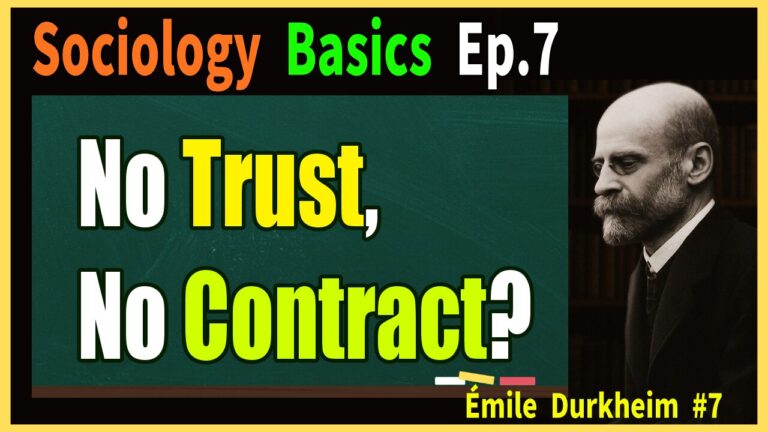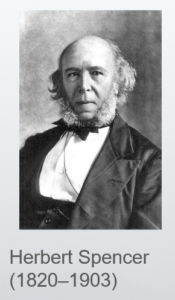Summary in the Video
Explanation in the video
The ‘Overview, Summary, or Conclusion’ of this article can be found at the beginning of the YouTube video, so please refer to it.
If possible, we would appreciate it if you could subscribe to our channel to help maintain the site. It serves as motivation for us!
Introduction
This video series is structured around four major works by Émile Durkheim.
- The Division of Labor in Society (1893)
- The Rules of Sociological Method (1895)
- Suicide: A Study in Sociology (1897)
- The Elementary Forms of Religious Life (1912)
First, here is the overall structure of Durkheim’s The Division of Labor in Society.
This article focuses specifically on Non-contractual elements in contracts.
The remaining topics will be discussed in the next video.
If you find this video helpful, please consider subscribing to the channel. It will motivate me to create the next one.
- Chronology
- What are the bonds that connect people to one another?
- What is division of labor and what are its functions?
- Why does division of labor produce social solidarity?
- [Column] What is sociology?
- The difference between mechanical solidarity and organic solidarity
- The difference between segmentary society and organized society
- Collective conscience and collective representations
- [Column] What is sociological theory?
- Examination of solidarity: repressive law and restitutive law
- Non-contractual elements in contracts
- A society without crime is unhealthy
- [Column] Durkheim’s critique of Tönnies
- Is individualism detrimental to solidarity?
- Coercive division of labor and anomic division of labor
- Intermediate groups as a measure against the adverse effects of modernization
What are non-contractual elements in a contract?
POINTNon-contractual elements in a contract (pre-contractual assumptions):refer to the idea that contracts are made possible by the prior existence of social norms and trust.
Why did Durkheim make such a claim? To answer this, it is helpful to examine his critique of the sociologist Spencer.
Criticism directed at Spencer
Herbert Spencer was a British sociologist who lived slightly earlier than Durkheim and shortly after Comte.
Influenced by Adam Smith’s laissez-faire liberalism and Darwin’s theory of biological evolution, he developed the theory of society as an organism.
In simple terms, this theory proposes that just as living organisms evolve through natural selection, societies also evolve over time.
This idea is similar to that of Comte and is based on an analogical way of thinking.
Spencer viewed society as something based on agreements arising from individual interests and believed that the development of society should emphasize individual freedom, arguing that social regulations hinder such development.
This view is closely aligned with Adam Smith’s concept of laissez-faire liberalism, which holds that free competition in the market leads to the most efficient economic outcomes.
According to this perspective, if individuals are left to act freely, society will evolve through natural selection, making regulation unnecessary.
Durkheim criticized Spencer’s view, pointing out that society is not merely a collection of individual economic interests and their agreements.
This critique is related to the so-called Hobbesian problem of order—namely, how social order emerges from a natural state.
The sociologist Talcott Parsons argued that social order is made possible by norms, but he tended to treat these foundational norms as given, without explaining the process by which they originally emerge.
The concept of contract in the theories of Luhmann and Parsons
The sociologist Niklas Luhmann also discussed the concept of contract.
According to conventional thinking, a “valid contract” is assumed to be based on actions stemming from the will of individual subjects.
However, Luhmann argued that what precedes this is a set of preconditions—such as what is considered valid, and what counts as agreement in the first place.
Luhmann argued that behind any agreement lies a prior agreement about the rules of agreement, which itself relies on another layer of agreement about those rules—leading to an infinite regress.
Therefore, any agreement can only function as something that is always already presupposed by action.
If society did not exist and individuals were completely isolated from one another, contracts would not emerge in the first place, and deceiving the other party would become the most rational strategy.
This would lead to a war of all against all—a state of anarchy.
Apart from deception, another possible outcome would be a more animalistic condition in which individuals submit to others through sheer force.
Nearly all human beings are born into a world where society already exists.
Every society has some form of morality, some form of law, and some degree of trust that has already been established.
In response to the question of how original social order—that is, norms and morality—first came into being, Parsons maintained that it must simply be taken as given.
In Luhmann’s framework, the system (society) exists first, followed by its elements (social actions and communication)—in other words, the chicken comes before the egg.
Because individuals do not know what others are thinking and each is a kind of black box, they engage in communication, through which certain rules emerge.
This is the basic idea behind Luhmann’s approach.
Because of the double contingency, social interaction is initiated, and the social system is generated.
There is an image of difference here: one approach, like Husserl’s phenomenology, tries to refine the notion of the origins as far as possible before concluding it is ultimately unknowable;
while another approach, like Heidegger’s, starts from the assumption of unknowability and interprets it as something given or gifted from the beginning.
Durkheim, like Parsons and Luhmann, regarded social order as a legacy inherited from preceding generations, something that cannot be reduced to mere private interests or individuals.
From this perspective, his view appears similar to Heidegger’s.
However, Durkheim goes further by specifically suggesting that a sense of the sacred may have influenced the idea of (primitive) contracts in some form.
The role of religion in this context will be explored in depth in a separate video.
The notion that religion influences economic behavior connects importantly to Weber’s idea that protestantism affected the development of capitalism.
References
Recommended Readings
Emile Durkheim「The Division of Labor in Society」
Emile Durkheim「「The Division of Labor in Society」
DK Publishing, Sarah Tomley「The Sociology Book: Big Ideas Simply Explained (DK Big Ideas) (English Edition)」
About the Japanese version of this article
This article is a translation of an article written in [https://souzouhou.com/2024/11/27/durkheim-4-1/]. For detailed references, please refer to this link.



Comments